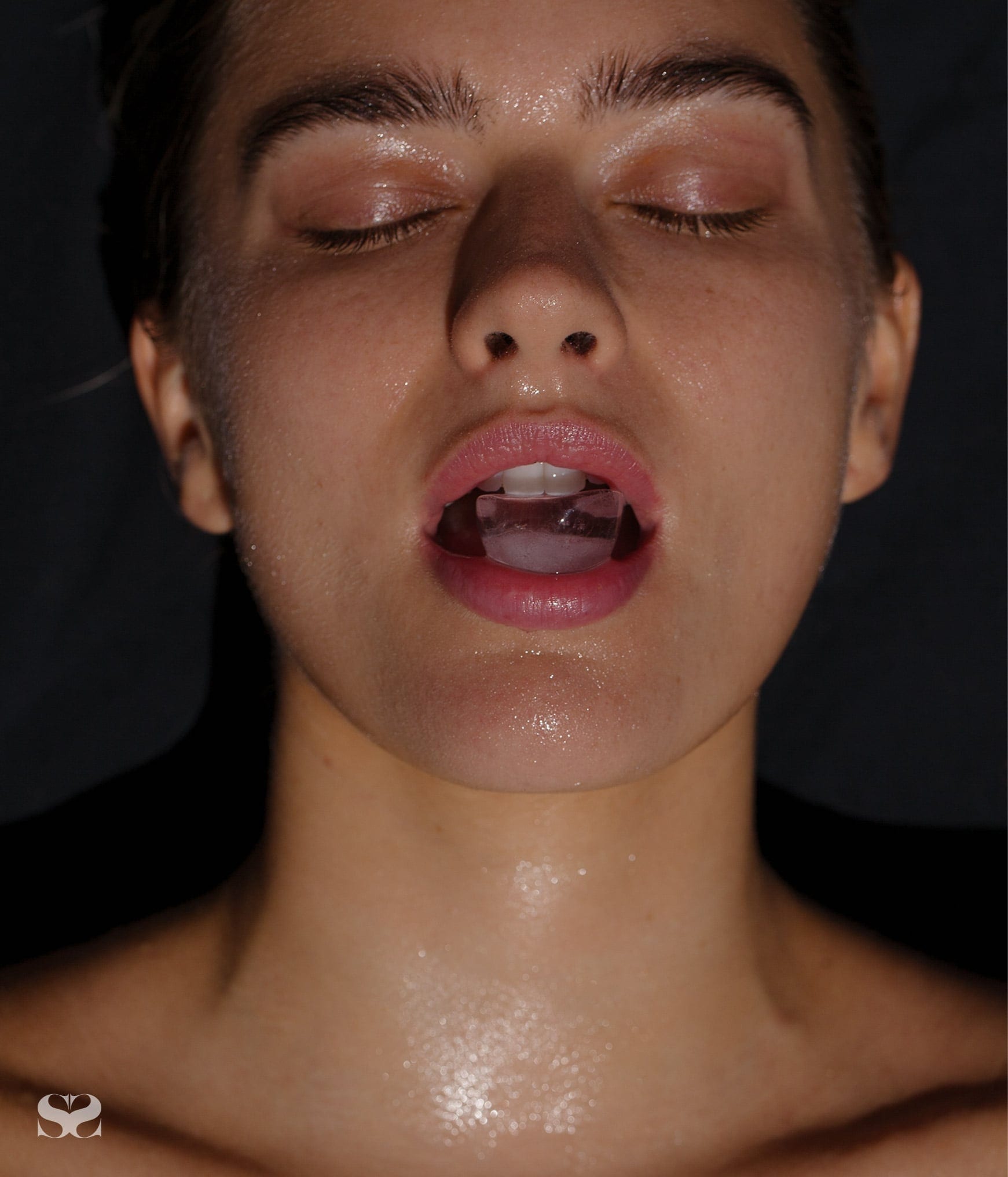
Here comes the sun. Are we better people once the mercury starts to rise?
There’s a perceptible shift in mood when those early days of summer roll around. Our sunlight hours bleed into the evening, the air is filled with the scent of gardenias and sunscreen and the torturous early morning alarms begin to feel, well, slightly less torturous. We emerge from dormant winter months anew – a little gun-shy perhaps at the first instance of stripping down into a bikini at the beach, but that first full body immersion in salt water is practically euphoric. If life had been feeling rather greyscale it’s as though we are suddenly living in bright technicolour. We might order a cocktail at 2pm. Take off our shoes and walk barefoot on the grass. Flirt with a stranger. Flirt with two. Wear that dress we’ve been saving for so many months, we’re ready to show some skin. The heat is officially on and we, in turn, feel profoundly changed.
Why is this? Physically we’re still the same people, and yet somehow we feel different. It could be chalked up to mind games – our brains are wired to seek out congruence, and we naturally associate dark, gloomy weather with sadness and bright weather with joy, but it feels more extreme than this. What is it about the heat that so profoundly impacts human behaviour? How is it that the changing of the seasons has the ability to acutely transform our outlook on life – what once seemed laborious (physically or emotionally) is now suddenly achievable. Simply, what is it about summer that makes us feel so damn good?
For the answer, we must look to the sun (not literally, please), a nearly perfect sphere of floating plasma and the source of life-giving heat, light and vital energy – worshipped by humans back to our earliest civilisations. During summer the length of time for which the sun appears in the sky is longer, therefore our ability to be exposed to its benefits is greater – the most important of which is its ability to convert into the hormone we know as Vitamin D. Professor of medicine and physiology, biophysics and molecular medicine at the Boston University Medical Centre, Michael F. Holick, has made a career out of examining the physical and neural effects that Vitamin D has on humans, and the consequences of not receiving adequate sun exposure. “Vitamin D is produced in the body when you are exposed to sunlight, and the major function of Vitamin D is to make sure that you are getting an adequate amount of calcium into the body by increasing the efficiency of your intestine to absorb calcium,” he explains down the line from his office in Boston. “But also, we now recognise that Vitamin D has very important overall benefits for your health.” Holick explains that when Vitamin D becomes activated, the hormone goes to your brain and can improve serotonin levels. “[It’s] the way anti-depressants work, to help maintain your serotonin levels in your brain. So we think there is a lot of chemical and biologic effects that occur in your skin as a result of being exposed to sunlight that are healthy for you and make you feel better.”
When we are exposed to sunlight we also make beta-endorphins in our skin – the happy substance that gives us what’s also known as ‘runner’s high’. “It makes you feel better. So it is very likely that one of the explanations for why people feel good when they are exposed to sunlight in the summer is because they are making beta-endorphins in their skin,” he says. Our capacity for relaxation is also heightened in the summer, Holick explains, “and one of the reasons is that you make nitric oxide, and release nitric oxide in your skin when you are exposed to sunlight. As a result it causes you to relax by causing vasodilation of your blood vessels (a widening of the vessels allowing for an increased flow) and that’s why your blood pressure can decrease.”
Given the feel-good chemicals coursing through our systems, it makes sense that summer increases our capacity for extraversion. Humans participate in a greater number of social interactions in warm weather – the inclination to get outdoors and follow through on invitations for revelry feels less tedious when heat is on your side, increasing opportunities for socialising with friends, meeting new people and embracing a generally more hedonistic approach to life. Our curfews are pushed back courtesy of those later sunsets, the desire to indulge in just one more glass of wine feels totally justified and, thanks to both of the above, the opportunity for romantic encounters increases. Our proclivity for flirtatious behaviour rises during this time of the year because we’re radiating great energy, and also receiving great energy from those around us. We feel less inhibited about making moves on potential suitors, we’re more amorous with current partners and, importantly, we’re feeling better about our own naked bodies.
Melbourne-based Psycho-Sexologist and Director of the Australian Institute of Sexology and Sexual Medicine, Chantelle Otten, says there is a strong connection between warmth and intimacy. “Research on embodied cognition – the formative role the environment plays in the development of cognitive processes – shows that warmth makes us more social,” she says. “When we feel hotter temperatures, we are more likely to feel a stronger connection with those around us. Summer also brings longer daylight hours and more holidays, so you have more time to get your work done and also play, reducing stress and deadline pressure. Stress and pleasure don’t mix, so having this alleviated could lead to confidence and playfulness.”
Why is this increase in playfulness so beneficial to us? Because, as Otten explains, satisfying sexual activity is an important part of our overall well-being and happiness.
“Those of us who engage in more good quality sexual activity report better quality of life and higher satisfaction across life domains. Touch also releases oxytocin, which is known as the ‘love hormone’. Because levels of oxytocin are released during hugging and orgasm … the chemical plays a role in regulating social interaction and sexual reproduction. It also contributes to us cultivating and maintaining intimate, healthy relationships.”
To put it simply, “positive mood has a positive association with sexual desire,” says Otten. “In winter, fatigue, stress, lack of sun and winter blues may result in lowered sexual desire. Cold has been regarded as a stress factor in many experimental studies looking into sexuality differences between seasons.”
One such study, Seasonal variations in sexual activity and their implications for sexual health promotion (K. Wellings et. al), published in the Journal of the Royal Society of Medicine highlights the fact that seasonally related social events may lead to an increase in levels of sexual activity, arguing that as the temperature climbs so too do our libidos: “The increase in sexual activity … has been linked with the end of the academic year (marked typically by celebrations and increased leisure time during the summer vacation), and the calendar year (associated with Christmas festivities).” The paper asserts that intensified social activities during these times provided greater opportunities for us to experience sexual encounters, noting “it is also associated with increased alcohol use, and the link between drinking and … sex, although not unequivocal, is well documented.” Another study published in the Journal of Biosocial Science titled Seasonal variation in human births (William H. James) states that there is a seasonal pattern in condom sales, with a greater volume of sales in the summer and a more pronounced peak in hotter years.
“The winter weather is a downer for sex as melatonin ... the sleep hormone ... is produced in large quantities instead of serotonin [leading to] more seasonal depression rather than happy days,” explains Otten. “With winter we also have excessive sleep, sugar cravings, moodiness and weight gain, which are signs of seasonal affective disorder (SAD). SAD affects women more than men, and a recent study found that women feel more attractive and are much happier in the summer months.”
That the season facilitates an ease to sexual encounters that cooler months do not shouldn’t come as any surprise considering the effort involved in shedding the layers of knitwear or laced footwear we cocoon ourselves in throughout winter. The coat might be off but there’s a jumper beneath, followed by a T-shirt, wait there’s a singlet, how far ’til the bra? By the time we’ve peeled off the last sock even the strongest flame of sexual appetite can be dimmed. The realities of less clothing worn in the summer (barely a slip of silk or linen separating you and your summer paramour) leads to less logistics. And we all know there’s nothing more arousing than a tryst devoid of logistics.
Otten says women also tend to hit the gym more frequently to achieve their clothing goals during the warmer seasons. “Summer often gives us the motivation to eat better and work out, which boosts our testosterone and in-turn our energy levels and libido.” It’s a pattern supported by Sydney-based nutritionist and herbalist Brittany Darling, who says that humans also eat less in summer. “They’re generally not as hungry as what they are during winter … they tend to have more of an appetite for lighter food like salad in the summer months.” Darling, who promotes a seasonal diet, explains that “if we’re eating seasonally those starchy vegetables like potatoes, carrots, are more available in winter. So, if we’re buying at farmer’s markets or organic markets, they’re the sort of things that we’re buying in those winter months,” she says. On the flip side, avocado, cucumber, corn, eggplant and zucchini are ripe for summertime eating, as well as an abundance of berries, sweet melons and stone fruits. “The earth is providing a lighter menu for us … nature certainly knows what nutrients we need in summer months versus the winter months and at what particular times,” she says.
This abundance of fresh produce, coupled with our desire to get in better shape, means that we’re happier, sexier and also healthier people in summer.
It’s a season of awakening for the body, the mind and the senses, and alongside these benefits (excuse the sentimentalities), summer is a shared joy. Oscar Wilde declared “conversation about the weather is the last refuge of the unimaginative,” however there is a reason why the subject makes for such effortless small talk: it is a catalyst for connectedness. When the weather is hot we are all able to bask in its communal warmth. So make the most of it – squeeze every single endorphin heightening, serotonin spiking, sexually pleasurable, physically and mentally stimulating experience out of the season.
It all belongs to you.



